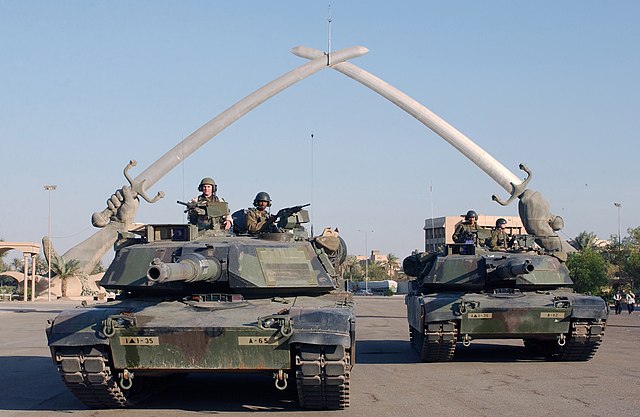The entirety of Germany was occupied and administered by the Allies of World War II from the Berlin Declaration on 5 June 1945 to the establishment of West Germany on 23 May 1949. Unlike occupied Japan, Germany was stripped of its sovereignty and former state: after Nazi Germany surrendered on 8 May 1945, four countries representing the Allies asserted joint authority and sovereignty through the Allied Control Council (ACC). At first, Allied-occupied Germany was defined as all territories of Germany before the 1938 Nazi annexation of Austria; the Potsdam Agreement on 2 August 1945 defined the new eastern German border by giving Poland and the Soviet Union all regions of Germany east of the Oder–Neisse line and divided the remaining "Germany as a whole" into four occupation zones, each administered by one of the Allies.
Royal Air Force's Malcolm Club in Schleswig, formerly the Stadt Hamburg Hotel in late 1945
British armoured car, at the Brandenburg Gate in Berlin, 1950
French forces in front of the Brandenburg Gate in Berlin, 1946
Cover of the 1947 Saar constitution
Military occupation, also called belligerent occupation or simply occupation, is the temporary control exerted by a ruling power's military apparatus over a sovereign territory that is outside of the legal boundaries of that ruling power's own sovereign territory. The controlled territory is then known as the occupied territory, with the ruling power being the occupant. Occupation is distinguished from annexation and colonialism on the basis that it is a power structure that the ruling power intends to keep in place only temporarily. In many cases, the occupant may establish a military government to facilitate the administration of the occupied territory, though this is not a necessary precondition for occupation to take place.
American tanks at the Victory Arch in the city of Baghdad during the occupation of Iraq, 2003
Indian troops of the 5th Royal Gurkha Rifles in the city of Kure during the Allied occupation of Japan, 1946
German troops at the Champs-Élysées in the city of Paris during the Prussian occupation of France, 1871
Lebanese protesters of the Cedar Revolution during the Syrian occupation of Lebanon, 2005








